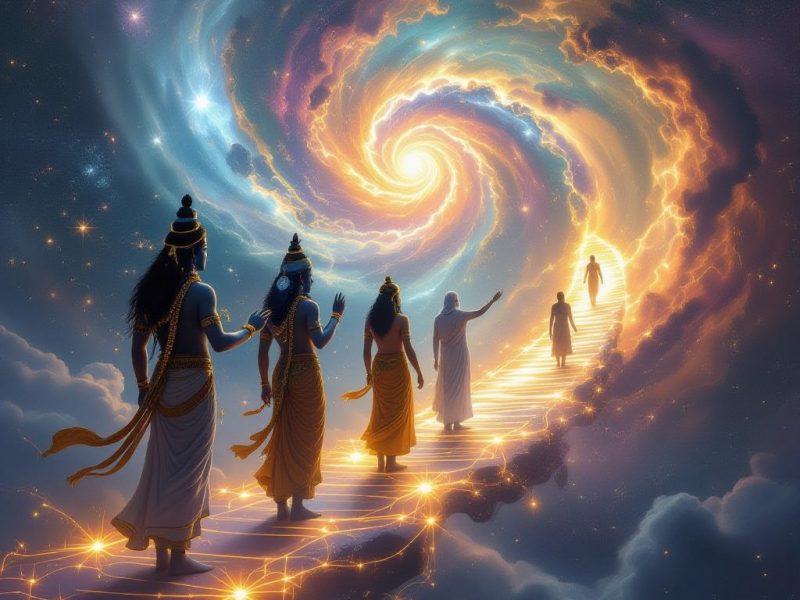Throughout human history, civilizations have sought to understand the cosmos and our place within it. This quest has given rise to rich mythologies, scientific explorations, and profound spiritual insights. By examining the intersections of mythology, astro-science, and ancient wisdom, we can uncover a holistic understanding of the universe that resonates across cultures and eras.
Mythology: Narratives of the Cosmos
Mythologies across the world have provided frameworks for understanding cosmic phenomena. These narratives often personify celestial bodies and natural forces, offering symbolic interpretations of the universe’s origins and operations.
Creation Myths and the Cosmic Ocean
Many cultures describe the universe emerging from a primordial sea or cosmic ocean. In Hindu mythology, the Rigveda speaks of the universe arising from the waters of chaos, with the concept of a cosmic ocean representing the undifferentiated state before creation. Similarly, Ancient Egyptian mythology describes the god Atum emerging from the watery chaos of Nun to create the world.
Axis Mundi: The World Axis
The concept of the axis mundi, or world axis, appears in various mythologies as a connection between the heavens and the earth. This is often symbolized by a sacred mountain, tree, or pillar. For instance, in Norse mythology, Yggdrasil is the world tree connecting different realms.
Astro-Science: Mapping the Heavens
While mythology offers symbolic narratives, astro-science provides empirical observations and theories about celestial phenomena. The study of astronomy has evolved from ancient stargazing to sophisticated explorations of the universe’s mechanics.
Ancient Astronomy and Astrology
Early civilizations meticulously observed the stars, leading to the development of calendars and astrological systems. The Babylonians, for example, recorded celestial movements and associated them with terrestrial events, laying the groundwork for astrology.
Modern Astronomy and Cosmic Understanding
Contemporary astronomy has expanded our knowledge of the universe, revealing the vastness of galaxies, the lifecycle of stars, and the existence of exoplanets. These discoveries continue to inspire awe and deepen our understanding of the cosmos.
Metaphysics and the Anima Mundi
Metaphysical concepts bridge the gap between mythology and science, offering philosophical interpretations of the universe’s nature. The idea of the anima mundi, or world soul, posits that the universe is a living, interconnected entity.
Hermeticism and Universal Correspondence
Hermetic philosophy, rooted in the teachings attributed to Hermes Trismegistus, emphasizes the interconnectedness of all things. The principle “As above, so below” suggests that patterns in the heavens are reflected on Earth, highlighting the unity between the macrocosm and microcosm.
Energy Healing and Ancient Practices
Ancient wisdom traditions have long recognized the presence of subtle energies within and around the human body. Practices like Reiki, acupuncture, and chakra balancing aim to harmonize these energies, promoting physical and spiritual well-being.
Chakras and Energy Centers
In Indian traditions, chakras are energy centers aligned along the spine, each associated with specific physical and emotional functions. Balancing these chakras is believed to facilitate the flow of vital energy, or prana, throughout the body.
Scientific Perspectives on Energy Healing
Modern research is beginning to explore the scientific basis of energy healing. Studies on the human biofield and the effects of practices like meditation suggest measurable impacts on health and consciousness.
Integrating Ancient Wisdom and Modern Science
The convergence of mythology, astro-science, and ancient practices offers a comprehensive view of the universe. By acknowledging the symbolic narratives of mythology, the empirical findings of science, and the experiential insights of spiritual traditions, we can cultivate a deeper connection to the cosmos and our place within it.
Conclusion: Embracing the Cosmic Symphony
Understanding the universe requires a multifaceted approach that honors the richness of human inquiry. By weaving together the threads of mythology, science, and ancient wisdom, we can appreciate the intricate symphony of existence and our role within this vast, interconnected cosmos.


